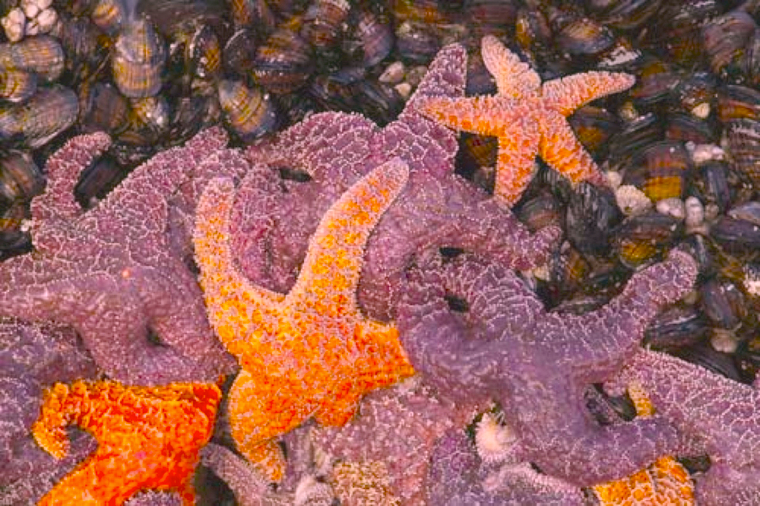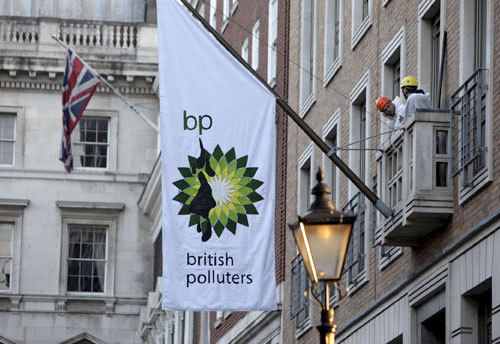freshwest
freshwest's JournalA healthy sea star:

Sunflower Sea Star
Photograph by Paul Nicklen, National Geographic
A sunflower sea star is draped moplike over a seafloor rock off the British Columbia coast. Though commonly called starfish, sea stars are not fish but echinoderms, more closely related to sea urchins and sand dollars. Only the five-armed species really resemble stars—others may boast as many as 40 appendages.
http://ocean.nationalgeographic.com/ocean/photos/starfish/
I've seen these:

Pisaster ochraceus
Pisaster ochraceus, generally known as the purple sea star, ochre sea star or ochre starfish, is a common starfish found among the waters of the Pacific Ocean...
Effects from ocean acidification
A study found that Pisaster ochraceus will not be affected by ocean acidification in the same way as most calcareous marine animals. This normally causes decreased growth due to the increased acidity dissolving calcium carbonate. Researchers found that when Pisaster ochraceus was exposed to 21 °C (70 °F) and 770 ppm CO2 (beyond rises expected in the next century) that they survived. It is thought that this is because the animals' calcium is nodular and so it is able to compensate for the lack of carbonate by growing more fleshy tissue instead.[14][15]
http://en.wikipedia.org/wiki/Pisaster_ochraceus
Well, something is killing them, isn't it?
This is heartbreaking. Like the BP oil volcano. I read about some fishermen who volunteered to fly helicopters over the Gulf to rescue marine animals. There were so many and the dead and dying animals seemed to go on forever.
One or more of the men committed suicide after seeing what to them, was unbearable. They were experienced mariners, but their hearts were too broken at what they saw. Like the death of the world, an apocalypse.
At times, I wonder if BP and other big polluters like the Koch brothers have knowledge about the demise of ecosystems and are just getting what they can before they all collapse, which seems to heartless and immoral to us, but logical to them?
One of my favorite pictures of the shoreline:

Will these images be all that remains of this living treasure in our midst?
That would be true from our POV, not theirs. I'll explain why:
Declaring oneself a caliphate is the easy partThey were working on that all along, and they are willing to kill to get it. Muslims have long had a vision of the return to what they considered to be a great period in their history.
Some of their writings, like Christian ones, take the position there will be no peace or justice until they rule the entire world. This will announcement will energize Muslims world wide to step up efforts to promote their faith. Christians look to the end times with joy as well, for their new world.
The costs to those who don't submit is death. Not unlike some eras in western history. This is a winning strategy, even though we don't like it.
Terror and ultra-violence don't do much to win the hearts and minds of the citizens.
They don't care about that, because it assumes free will on the part of those whose hearts and minds you refer Any group that has made it abundantly clear that they will kill anyone who doesn't agree with them on all matters, does not care for hearts or minds. Their input is not needed or wanted, as that is the method of democracy, not theocracy.
Or, allegiance from others outside the borders.
They want a world with no borders, the idea of a caliphate or in Christian theology, Kingdom Come, there will be no nations, all will serve God and follow their rules. They do not respect nations or borders because they regard those as constructs of a system they despise.
What do you think of my analysis of this? Is it too cynical or depressing? Do you really think they care?
I don't hate guns; I grew up in a different generation with LOTS of regulations and except for the
terrorists such as the KKK using them, there was not a crowd worshiping the 2nd Amendment as we have now and none of the insane rhetoric on the media about killing liberals, Obama and practicing bringing down the government. My dad was in WW2 and I wrote about this insane clown posse here:http://www.democraticunderground.com/10023843005#post19
http://www.democraticunderground.com/10023843601#post7
http://www.democraticunderground.com/101676074#post2
My dad had a gun which was permitted but only because he carried large sums of cash from his business home after the banks closed, but never had to use them. The only time he came close to using one was when a man broke into our house and made for the girls' bedroom. He didn't 'stand his ground' and kill the man, he knew he didn't have to do that.
He did pistol whip him and call the police who arrested the man, a felon with a record. He never brandished his weapon, never indulged himself in hate (for that is what it is, an indulgence that tastes sweet to fools), never bragged how he hated the government, nv=ever acted like no one could tell him what to do, ran his mouth or anything. He was a big man, and quite gregarious and wanted peace, and he didn't need the security of constant carry.
The ownership and use of a gun should be in all cases handled with all the solemnity of putting down a pet, turning off life support to a braindead relative or burying the dead. IT IS A TRAGEDY in all phases, from beginning to end.
It is to be used in an absolute necessity, not because one is offended or paranoid that 'those people' might hurt one There should be NO JOY or PRIDE in using a gun or killing ANYTHING, loving how a weapon works, glamorizing its lethality, or preparing to kill anything or anyone. That is pure psychopathy and hatred for life. Yet they call themselves 'pro-life' but fantasize about killing - Jesus said it's what in your heart that you will be judged for - they need to take a look at that bottomless pit in their chest and soul.
These clowns are devolving our society into something worse than the old west or the fascist regimes we once spoke out about, with death squads. The CTers call America a 'police state' with all the zeal of Jared Miller, but have worn blinders about just how much of the world is ruled that way, where people can't vote and change anything.
We still can, but they seem to want it to all burn, for the hell of it, out of malice for some thing that offended them, so they refuse to do anything constructive. Will they be there to protect the vulnerable, the unpopular and poor then?
Don't count on it as there isn't an altruistic bone in their pathologically selfish, miserable bodies.
This may work. BP is still trying to get out of paying damages after they lost their last case.
And this pic isn't anti-British bias, as it was hung outside a window in London itself. Not everyone loves BP there.Some of the most vociferous voices are in the UK, who speak of the cozy relationships of the royals of the UK and the oil sheikdom rulers. And the USA ended just as heavily involved in these acts.

BP plc,[5][6] sometimes referred to by its former name British Petroleum
...BP's origins date back to the founding of the Anglo-Persian Oil Company in 1909, established as a subsidiary of Burmah Oil Company to exploit oil discoveries in Iran. In 1935, it became the Anglo-Iranian Oil Company and in 1954 British Petroleum.[15][16] In 1959, the company expanded beyond the Middle East to Alaska and in 1965 it was the first company to strike oil in the North Sea. British Petroleum acquired majority control of Standard Oil of Ohio in 1978. Formerly majority state-owned, the British government privatised the company in stages between 1979 and 1987. British Petroleum merged with Amoco in 1998, becoming BP Amoco plc, and acquired ARCO and Burmah Castrol in 2000, becoming BP plc in 2001. From 2003 to 2013, BP was a partner in the TNK-BP joint venture in Russia.
BP has been directly involved in several major environmental and safety incidents. Among them were the 2005 Texas City Refinery explosion, which caused the death of 15 workers and resulted in a record-setting OSHA fine; Britain's largest oil spill, the wreck of Torrey Canyon; and the 2006 Prudhoe Bay oil spill, the largest oil spill on Alaska's North Slope, which resulted in a US$25 million civil penalty, the largest per-barrel penalty at that time for an oil spill.[17]
The 2010 Deepwater Horizon oil spill, the largest accidental release of oil into marine waters in history, resulted in severe environmental, health and economic consequences,[18] and serious legal and public relations repercussions for BP. One-point-eight million gallons of Corexit oil dispersant were used in the cleanup response, becoming the largest application of such chemicals in US history.[19] The company plead guilty to 11 counts of felony manslaughter, two misdemeanors, and one felony count of lying to Congress, and agreed to pay more than $4.5 billion in fines and penalties, the largest criminal resolution in US history.[20][21][22] Legal proceedings are continuing, with proceedings set to commence in January 2015[23] to determine payouts and fines under the Clean Water Act and the Natural Resources Damage Assessment.[24] BP faces damages of up to $17.6 billion in the trial...[25][26][27]
Looking at the Wikipedia page, we can see the reach of this entity worldwide. More of the history of BP, formerly British Petroleum, with name changes:
Nationalisation and coup
Discontent in Iran
Under the 1933 agreement with Reza Shah, AIOC had promised to give laborers better pay and more chance for advancement, build schools, hospitals, roads and telephone system. It had not done so.[11]
In August 1941, the Allied powers Britain and the Soviet Union invaded and occupied Iran subsequently forcing Reza Shah to abdicate in favor of his son (see also Persian Corridor) who they considered far more friendly to their interests.
Following World War II, nationalistic sentiments were on the rise in the Middle East; most notable being Iranian nationalism. AIOC and the pro western Iranian government led by Prime Minister Ali Razmara initially resisted nationalist pressure to revise AIOC's concession terms still further in Iran's favour. In May 1949, Britain offered a "Supplemental oil agreement" to appease unrest in the country. The agreement guaranteed royalty payments would not drop below £4 million, reduced the area in which it would be allowed to drill, and promised more Iranians would be trained for administrative positions. The agreement, however, gave Iran no "greater voice in company's management" or right to audit the company books. In addition, Iranian royalties from oil was not expected to ever drop to the proposed guarantee of £4 million and the reduced area covered all of the productive oilfields. When the Iranian Prime Minister tried to argue with AIOC head Sir William Fraser, Fraser "dismissed him" and flew back to the UK.[12]
In late December 1950 word reached Tehran that the American-owned Arabian American Oil Company had agreed to share profits with Saudis on a 50-50 basis. The UK Foreign Office rejected the idea of any similar agreement for AIOC.[13]
On March 7, 1951 Prime Minister Haj Haj Ali Razmara was assassinated by the Fadayan-e Islam. Fadayan-e Islam supported the demands of the National Front, which held a minority of seats in Parliament, to nationalize the assets of the British Anglo-Iranian Oil Company. As Prime Minister, Razmara had convinced the majority that nationalization would be folly, but his assassination eliminated the sole voice powerful enough to oppose the demands of the National Front. Iranian anger towards lack of progress in the nationalization of AIOC was apparent when the assassination of Razmara,[14] yielded a distinct lack of mourning from the Iranian public. A raucous walkout of protest by newspaper reporters ensued when a visiting American diplomat urged 'reason as well as enthusiasm' to deal with the imminent British embargo of Iran.[15]
By 1951 Iranian support for nationalisation of the AIOC was intense. Grievances included the small fraction of revenues Iran received. In 1947, for example, AIOC reported after-tax profits of £40 million ($112 million)—and the contractual agreement entitled Iran to just £7 million or 17.5% of profits from Iranian oil.[11] In addition, conditions for Iranian oil workers and their families were very bad. The director of Iran's Petroleum Institute wrote that
Wages were 50 cents a day. There was no vacation pay, no sick leave, no disability compensation. The workers lived in a shanty town called Kaghazabad, or Paper City, without running water or electricity, ... In winter the earth flooded and became a flat, perspiring lake. The mud in town was knee-deep, and ... when the rains subsided, clouds of nipping, small-winged flies rose from the stagnant water to fill the nostrils .... Summer was worse. ... The heat was torrid ... sticky and unrelenting—while the wind and sandstorms shipped off the desert hot as a blower. The dwellings of Kaghazabad, cobbled from rusted oil drums hammered flat, turned into sweltering ovens. ... In every crevice hung the foul, sulfurous stench of burning oil .... in Kaghazad there was nothing—not a tea shop, not a bath, not a single tree. The tiled reflecting pool and shaded central square that were part of every Iranian town, ... were missing here. The unpaved alleyways were emporiums for rats.[16]
Nationalisation
Later in March 1951, the Iranian parliament (the Majlis) voted to nationalise the Anglo-Iranian Oil Company (AIOC) and its holdings, and shortly thereafter Iranians democratically elected a widely respected statesman and champion of nationalisation, Mohammed Mossadegh, Prime Minister.[17] This led to the Abadan Crisis where foreign countries agreed not to purchase Iranian oil under British pressure and the Abadan refinery was closed. AIOC withdrew from Iran and increased output of its other reserves in the Persian Gulf.
Mossadeq broke off negotiations with AIOC in July 1951 when the AIOC threatened to pull its employees out of Iran and Britain warned tanker owners that "the receipts from the Iranian government would not be accepted on the world market."[18] The British ratcheted up the pressure on the Iranian government and explored the possibility of an invasion to occupy the oil area. US President Harry S. Truman and US ambassador to Iran Henry F. Grady opposed intervention in Iran but needed Britain's support for the Korean War. Efforts by the U.S. through the International Court of Justice were made to settle the dispute, but a 50/50 profit-sharing arrangement, with recognition of nationalization, was rejected by both the British government and Prime Minister Mossadegh.[citation needed]
As the months went on, the crisis became acute. By mid-1952, an attempt by the Shah to replace Mossadegh backfired and led to riots against the Shah and perceived foreign intervention; Mossadegh returned with even greater power. At the same time however, his coalition was weakening as Britain’s boycott of Iranian oil eliminated a major source of government revenue, and strategically made Iranians poorer and thus unhappier by the day.
Coup[edit]
Main article: 1953 Iranian coup d'état
http://en.wikipedia.org/wiki/1953_Iranian_coup_d%27%C3%A9tat
Britain was unable to subvert Mossadegh as its embassy and officials had been evicted from Iran in October 1952, but successfully appealed in the U.S. to exaggerated anti-communist sentiments, depicting both Mossadegh and Iran as unstable and likely to fall to communism as they were weakened. If Iran fell, the "enormous assets" of "Iranian oil production and reserves" would fall into Communist control, as would "in short order the other areas of the Middle East".[19] By 1953 both the US and the UK had new, more anti-communist and interventionist administrations and the United States no longer opposed intervention in Iran.
The anti-Mossadeq plan was orchestrated under the code-name 'Operation Ajax' by CIA, and 'Operation Boot' by SIS (MI6).[20][21][22] In August the American CIA with the help of bribes to politicians, soldiers, mobs, and newspapers, and information from the British embassy and secret service, organized a riot which gave the Shah an excuse to remove Mosaddeq.
The Shah seized the opportunity and issued an edict forcefully removing the immensely popular and democratically-elected Mosaddeq from power when General Fazlollah Zahedi led tanks to Mosaddeq's residence and arrested him. On 21 December 1953, he was sentenced to death but his sentence was later commuted to three years' solitary confinement in a military prison followed by life in prison. He was kept under house arrest at his Ahmadabad residence, until his death, on 5 March 1967.[23][24][25][26]
Consortium[edit]
With a pro-Western Shah and the new pro-Western Prime Minister, Fazlollah Zahedi, Iranian oil began flowing again and the Anglo-Iranian Oil Company, which changed its name to British Petroleum in 1954, tried to return to its old position. However, public opinion was so opposed that the new government could not permit it.
Under pressure from the United States, British Petroleum were forced to accept membership in a consortium of companies which would bring Iranian oil back on the international market. It was incorporated in London in 1954 as a holding company called Iranian Oil Participants Ltd (IOP).[27][28] The founding members of IOP included British Petroleum (40%), Gulf Oil (later Chevron, 8%), Royal Dutch Shell (14%), and Compagnie Française des Pétroles (later Total S.A., 6%). The four Aramco partners—Standard Oil of California (SoCal, later Chevron), Standard Oil of New Jersey (later Exxon, then ExxonMobil), Standard Oil Co. of New York (later Mobil, then ExxonMobil), and Texaco (later Chevron)—each held an 8% stake in the holding company.[27][29]
This group of companies at various stages came to be known as the Supermajors or the "Seven Sisters" or the "Consortium for Iran" cartel and dominated the global petroleum industry from the mid-1940s to the 1970s.[30][31] Until the oil crisis of 1973 the members of the Seven Sisters controlled around 85% of the world's known oil reserves.
All IOP members acknowledged that National Iranian Oil Company (NIOC) owned the oil and facilities in Iran, and IOP's role was to operate and manage on behalf of NIOC. To facilitate that, IOP established two operating entities incorporated in Netherlands, and both were delegated to NIOC.[27][28] Similar to the Saudi-Aramco "50/50" agreement of 1950,[32] the consortium agreed to share profits on a 50–50 basis with Iran, "but not to open its books to Iranian auditors or to allow Iranians onto its board of directors."[19][33] The negotiations leading to the creation of the consortium, during 1954-55, was considered as a feat of skillful diplomacy for the "Seven Sisters".[29] Some viewed the move as one to quell the rising tensions of Iranians since it allowed IOP to divert and hide profits with ease - effectively controlling Iran's share of the profits.
http://en.wikipedia.org/wiki/Anglo-Persian_Oil_Company#Coup
Knew a number of Iranians who moved to the USA for a better life than they had under the Shah. They were complete secularists and fit in well with unions. blue collar work, supported feminism, etc. They really loved the USA.
Every week, Iranians were in front of the ARAMCO corporate offices to protest its support of the Shah. This was before Khomeini and the hostage crisis. They were all very friendly to Americans, but puzzled by the USA supporting the Shah, who was bad news. It did not fit with their dream of America.
BP has now gained the title of 'Beyond Petroleum' as they are heavily invested in wind and other alternative energies. But they are unlikely to escape their past and present wrongdoings.
Just sayin'
Ain't just Facebook. Wouldn't touch them or Twitter with a ten foot pole for privacy reasons...
But then all sites connected to Google are problematic, which includes DU as it's very hard to get the kind of connectivity online without Google...

I love this! It resonates with me. Particularly like this from the link:

Natural law was the basis for the core ideas of the Revolution: People are free and equal in nature. Government is a compact between human beings, not something handed down from above.
Most important, we must always have the liberty of thought to examine received wisdom, evaluate its utility, and change our ideas — and our institutions.
In particular this part:
People are free and equal in nature.
Got a chuckle from this:
"Jefferson's vision for the future of American religion … featured nothing but Unitarian churches from sea to shining sea."
A better America than one divided into various cults with their supporters and enemies. Very close to what I grew up with.
From the first Amazon review, but all of them are very good:
“Splendid… imaginative but never fanciful, even at its most surprising. What lends Nature’s God a good deal of its verve is Matthew Stewart’s unabashed attachment not only to the revolutionaries as they really were but to the skeptical rationalism they embodied. This is partisan scholarship as it should be written, and much needed service to the public.” (Alan Ryan, author of The Making of Modern Liberalism)
http://www.amazon.com/Natures-God-Heretical-American-Republic/dp/0393064549/ref=sr_1_cc_1?s=aps&ie=UTF8&qid=1404062887&sr=1-1-catcorr&keywords=Nature%27s+God%3A+The+Heretical+Origins+of+the+American+Republic
Thanks for posting this. I'm also interested in on of his other books listed below the Amazon page on Nature's God...
The Management Myth: Debunking Modern Business Philosophy
"Here he (Matthew Stewart) brilliantly sets about unpicking the central tenets of management thinking... Elegant hatchet job on the management consultancy industry and the damage it's done." Director CNBC Business
"Business Schools turning out MBA graduates are big business, and they are not going to love Stewart, whose thesis is that 'the modern idea of management is right enough to be dangerously wrong'...serious and valuable polemic." The Times - The Wall Street Journal.
http://www.amazon.com/The-Management-Myth-Debunking-Philosophy/dp/0393338525/ref=pd_sim_sbs_b_3?ie=UTF8&refRID=1KS89TEB0G5GE70S6Y3F
Randian business methodolgy needs to be rooted out. At one time we had true community oriented business models (not the faux ones to deceive us) that gave us stability and business owners who were accountable to more than just their shareholders.
The Supreme Court and the conservatives are trying to write the most regressive practices in stone and destabilizing the USA. It's going to be a long haul to reverse this and it starts NOW in 2014 to put the reactionaries out of office. Or we're done.
Trumad, this how we see you:

Just come closer, we won't bite!

Let's all enjoy some ice cream:

And we'd love to meet you!
Snakes and bees 'flush out' Boko Haram fighters (Warning: snake pic)
26 June 2014

The Nigerian Army is struggling to flush Boko Haram Islamist fighters out of their forest fastness, but it seems snakes may be doing the job for them.
Two suspected Boko Haram gunmen captured by local volunteers in Maiduguri, northeastern Nigeria, said they had fled the Sambisa Forest because of "incessant snake bites", the Vanguard newspaper reports.
One of the suspects, Kolo Mustapha, said bees have also been known to join in the attacks, often leaving their victims fatally injured. Some of his fellow-fighters think there is a supernatural aspect to the attacks, fearing that Boko Haram's victims are wreaking vengeance on their killers. Mustapha said he was caught because, like many others, he was trying to sneak back into town "as we have nowhere else to go". "Our leaders have fled to Cameroon," he added, saying they had forced local youths to join the group.
The other captive, Umar Abor, said "almost all our comrades are leaving the Sambisa because of constant attacks by snakes and bees". Many accuse Boko Haram leaders of having brought the plague upon themselves by kidnapping and killing civilians. The Civilian JTF volunteers agree that fighters have been fleeing the forest in growing numbers over the past two weeks, and were helping the security forces find weapons caches.
http://www.bbc.co.uk/news/blogs-news-from-elsewhere-28034240
Hope Nigeria gets a break from the violence there.
Profile Information
Member since: Fri Dec 10, 2010, 11:36 PMNumber of posts: 53,661
